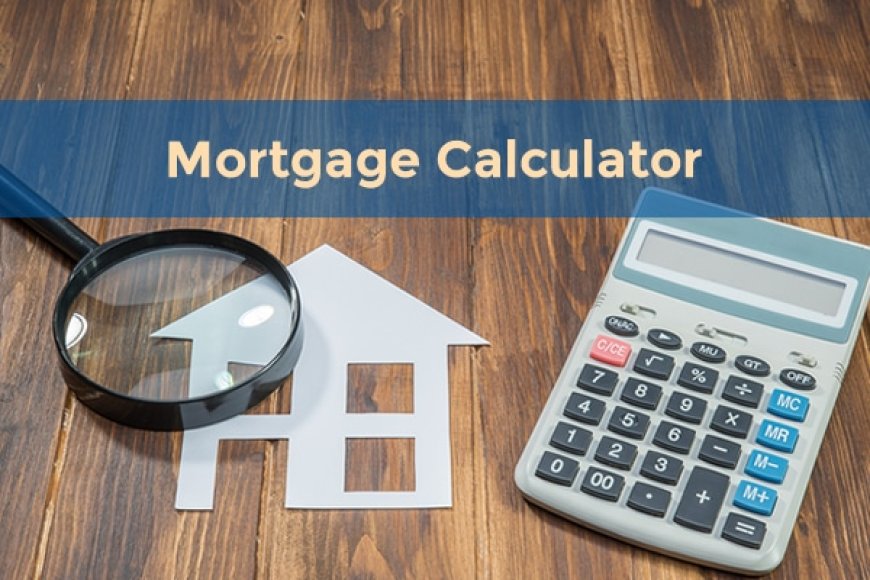How to Use a Mortgage Calculator to Plan Your Finances
mortgage calculator

One of the most important steps on the path to homeownership is financial planning. An indispensable tool for figuring out how much house you can buy, how much your monthly mortgage payments will be, and which loans are best for you financially is a mortgage calculator. Here's a thorough tutorial on using a mortgage calculator to make well-informed financial plans.
What is a Mortgage Calculator?
Using a variety of parameters, such as the loan amount, interest rate, loan length, and down payment, an online mortgage calculator can assist you in estimating your monthly mortgage payments. It gives you information on how various factors impact your mortgage, enabling you to make well-informed decisions about the purchase of a property.
Key Features of a Mortgage Calculator
- Loan Amount: The total amount of money you need to borrow to buy a home.
- Interest Rate: The percentage charged by the lender for borrowing the money.
- Loan Term: The period over which you will repay the loan, typically 15, 20, or 30 years.
- Down Payment: The amount of money you pay upfront towards the purchase of the home.
- Property Taxes: Annual taxes paid to the local government, often included in monthly mortgage payments.
- Homeowner's Insurance: A policy that protects your home against damages and losses.
- Private Mortgage Insurance (PMI): Insurance required if your down payment is less than 20% of the home’s purchase price.
Steps to Using a Mortgage Calculator
1. Gather Financial Information
Before using a mortgage calculator, gather the following information:
- Your yearly salary
- Debts due each month (credit cards, auto loans, etc.)
- Estimated homeowner's insurance and property taxes
- Ideal loan amount and duration
- Anticipated down payment
2. Input Basic Information
Start by entering the basic details into the mortgage calculator:
- Home Price: The price of the home you want to buy.
- Down Payment: The amount you plan to pay upfront. The calculator will automatically subtract this from the home price to determine your loan amount.
- Loan Term: Choose the length of time you plan to take to repay the loan (e.g., 15, 20, or 30 years).
- Interest Rate: Enter the interest rate you expect to receive. You can get this information from lenders or current market rates.
3. Add Additional Costs
Include additional costs to get a more accurate estimate of your monthly payments:
- Property Taxes: Estimate your annual property taxes. This amount can usually be found on local government websites or by asking your real estate agent.
- Homeowner's Insurance: Enter your annual insurance premium. You can get a quote from insurance companies or use average rates for your area.
- PMI: If your down payment is less than 20%, enter the PMI rate. This information can be obtained from your lender.
4. Review the Results
The mortgage calculator will provide you an estimate of your monthly mortgage payment once you've entered all the necessary data. Usually, this sum consists of:
- Principal and interest
- Property taxes
- Homeowner's insurance
- PMI (if applicable)
5. Analyze Different Scenarios
Use the mortgage calculator to explore different scenarios and their impact on your finances:
- Vary the Down Payment: See how increasing or decreasing your down payment affects your monthly payments and overall loan cost.
- Adjust the Loan Term: Compare the differences between a 15-year and a 30-year mortgage. A shorter term typically has higher monthly payments but lower overall interest costs.
- Change the Interest Rate: Understand how changes in the interest rate impact your payments. This is useful if you’re considering fixed vs. adjustable-rate mortgages.
Benefits of Using a Mortgage Calculator
1. Budgeting and Planning
A mortgage calculator estimates your monthly mortgage payments, which helps you make a budget that works. This enables you to budget your money wisely and make sure you don't go overboard.
2. Comparison Shopping
You can examine numerous loan choices and select the one that best suits your financial condition by altering various inputs. By assisting you in locating the best terms, this might ultimately save you money.
3. Understanding Affordability
Your search for a home can be more focused if you know how much you can afford. This helps you concentrate your efforts on homes within your price range and avoids spending time on ones that are outside of it.
4. Preparation for Lender Discussions
Talking with lenders in an intelligent manner is possible when you are well-informed about your mortgage alternatives. You can negotiate better terms and make more assured decisions with this knowledge at your disposal.
Tips for Using a Mortgage Calculator
- Be Realistic with Estimates: Use realistic numbers for your income, expenses, and other financial details to get an accurate picture of your mortgage affordability.
- Account for Additional Costs: Remember to include all possible expenses, such as HOA fees, maintenance, and utilities, to get a complete view of your financial commitment.
- Regularly Update Information: As market conditions change, so do interest rates and loan terms. Regularly update the information in the mortgage calculator to reflect current rates and offers.
When buying a house, a mortgage calculator is an invaluable tool that may assist you in budgeting and decision-making. A seamless home-buying experience can be ensured by selecting the optimal loan option based on your understanding of how various aspects affect your mortgage. Use this tool to research loan possibilities, create an effective budget, and get ready for lender negotiations to set yourself up for success on your path to becoming a homeowner.












